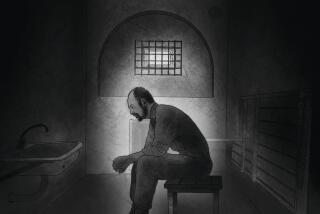Cold, Crisis, Poverty Rule Russiaâs North
ARKHANGELSK, Russia â When the pale winter sun creeps above the ghostly white horizon, this subarctic city looks like a postcard. There is scarcely a hint of its residentsâ desperate struggle for survival.
Schoolchildren ski down the broad, frozen Dvina River. Parents tow toddlers on sleds down streets lined with mounds of pure white snow. Commuters trek across the ice from a nearby island on a makeshift path strung with lights for the winter darkness.
But in a rundown factory district a few miles away, kids in parkas sit shivering in chilly classrooms, epitomizing the growing numbers in Russiaâs north who have fallen into poverty and live with little heat and little hope.
Several of the youngsters are wan from poor health or hunger, and their teachers and parents havenât been paid in months.
âI wish it were warm in class and at home,â says Anya, a skinny 8-year-old with strawberry-blond hair, somberly answering her teacherâs question about what children want. âAnd I wish there were enough books and clothes for all of us.â
In a country mired in an economic depression since the Soviet Unionâs collapse, few places have it tougher than the hardscrabble north.
Many Russians were lured to this harsh environment by Soviet authorities, who paid them comparatively high wages and housed them in industrial and military complexes thrown up on tundra or plains along the White Sea coast.
But now, while state workers still receive northern pay supplements, the Soviet-era safety net is virtually gone and government support has plummeted, along with living standards.
In Arkhangelsk, a port city at the same latitude as Iceland and Fairbanks, Alaska, factories stand idle, critically low supplies of oil and gas force frequent heat and electricity cutoffs, wages are low, and pension payments are late.
Temperatures occasionally drop as low as 30 below zero, causing aging pipes to break and leaving districts without heat and hot water, sometimes for days at a time.
The far northâs problems, to a large extent, are the same as those faced by Russians everywhere, but the severity of its winter and its remoteness make deprivation deadlier. And the situation is worsening.
Russiansâ worst nightmares about the future have become reality in a forest outside Arkhangelsk, where 2,000 people live in Dickensian conditions in the industrial settlement around Sawmill No. 29.
The workers and their families live in ramshackle wooden barracks, subsisting on bread and potatoes and waiting for back wages that never come as they try to stay alive until the dilapidated plant reopens.
It seems almost unthinkable, but except for token amounts, they have not received their average $50-a-month wages for more than a year--since December 1995.
Down the street from Anyaâs freezing school, ashen-faced men mechanically shovel wood chips into a giant outdoor furnace to provide minimal heat for the settlement. The state-controlled sawmill has been idle since July, closed by a lack of money and a business and ownership dispute.
Destitute, unable to find other jobs and perhaps unwilling to accept that the state no longer takes care of their needs, the workers show up periodically just to keep their places on the payroll.
âWe can scarcely keep our bodies and souls together,â says a dejected-looking Mikhail Vaganov, 49. âBut where can we go? What can we do? Thereâs nothing we can do but wait.â
Two dozen workers stand in a cramped reception room outside the local administratorâs office, waiting to demand their 15 monthsâ back wages. But there is still no money, no explanation. The manager slips out almost unnoticed, avoiding the employees and a reporter.
The main income supporting the residents seems to come from struggling pensioners.
Even sharing the pension money among relatives is not enough to keep everyone alive. A few weeks ago, a 32-year-old mother of three died of starvation, residents say.
Bundled-up pensioners commiserate with one another as they stand in line in an unheated post office to get their meager, overdue state payments. Frosty puffs of breath punctuate their complaints.
âWhen we lived under communism, we got paid on time, we lived OK, and no one froze to death,â says Nina Lamarova, 52, a resident of the sawmill settlement since 1956.
How can the settlement be seemingly ignored by the authorities?
Regional officials, laden with huge debts to energy suppliers, say there are simply too many problems and not enough money. They alternately blame Moscow, one another and consumers and enterprises that fail to pay their bills.
âTo help everybody is simply not possible,â says Nikolai Malakov, the regionâs chief administrator.
Instead, the regional administration is putting its hopes on an âanti-crisis programâ aimed at attracting investment to the timber-rich area and at reviving industry.
In the meantime, Arkhangelsk--founded by Ivan the Terrible and established as Russiaâs first seaport by Peter the Great--is increasingly preoccupied with survival.
Long renowned for their endurance and stoicism, desperate Russians are now staging regular strikes to protest wage delays. Teachers, submarine plant workers, doctors and others in the Arkhangelsk area have gone on strike this winter, and others have tried hunger strikes and emergency appeals to Moscow.
With nowhere else to turn, many people have begun writing open letters to newspapers, pleading for their back pay or other assistance.
âMany of us, on the verge of death, have forgotten what meat and butter are,â a teacher wrote. âBread has become a luxury.â
More to Read
Sign up for Essential California
The most important California stories and recommendations in your inbox every morning.
You may occasionally receive promotional content from the Los Angeles Times.










